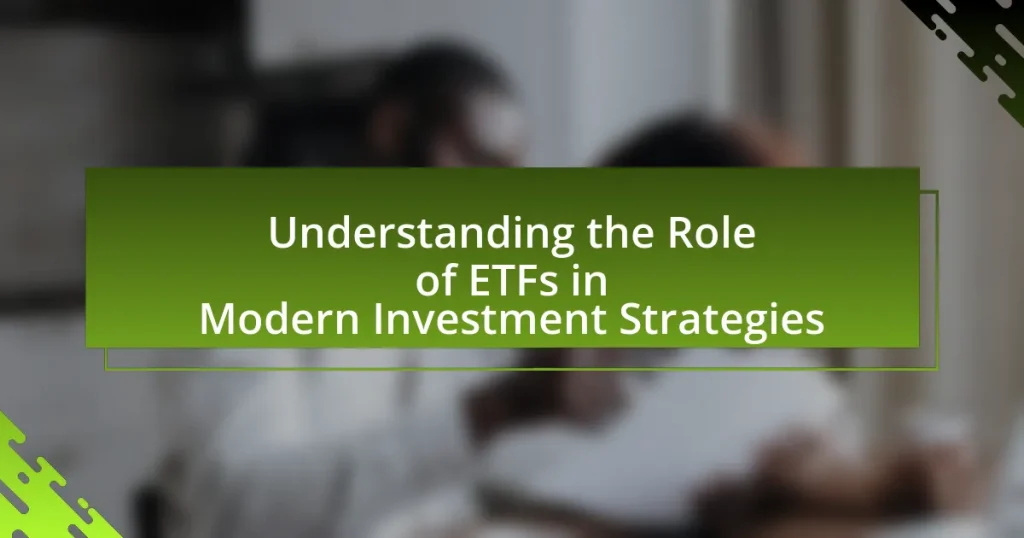The main entity of the article is the psychology of investing, which examines the emotional and cognitive factors influencing investors’ decisions in financial markets. The article explores how emotions such as fear, greed, and overconfidence can lead to irrational decision-making and suboptimal investment strategies. It discusses key emotional factors affecting investors, the role of cognitive biases, and the importance of understanding investor psychology for better decision-making. Additionally, it provides practical strategies for managing emotions, enhancing emotional resilience, and maintaining a disciplined investment approach to improve overall investment performance.

What is the Psychology of Investing?
The psychology of investing refers to the emotional and cognitive factors that influence investors’ decisions and behaviors in financial markets. This field examines how emotions such as fear, greed, and overconfidence can lead to irrational decision-making, impacting investment strategies and outcomes. Research indicates that cognitive biases, such as loss aversion and herd behavior, significantly affect how investors react to market fluctuations, often leading to suboptimal investment choices. For instance, a study by Barberis and Thaler (2003) highlights how psychological factors can lead to market anomalies, demonstrating that investor sentiment can drive stock prices away from their fundamental values.
How do emotions influence investment decisions?
Emotions significantly influence investment decisions by affecting risk perception and decision-making processes. Investors often experience fear and greed, which can lead to irrational behaviors such as panic selling during market downturns or overconfidence in rising markets. Research by the Behavioral Finance Institute indicates that emotional responses can lead to suboptimal investment choices, as individuals may ignore fundamental analysis in favor of emotional reactions. For instance, a study published in the Journal of Behavioral Finance found that investors who allowed emotions to guide their decisions often underperformed compared to those who maintained a rational approach. This demonstrates that emotions play a critical role in shaping investment strategies and outcomes.
What are the key emotional factors that affect investors?
The key emotional factors that affect investors include fear, greed, overconfidence, and loss aversion. Fear can lead to panic selling during market downturns, while greed may drive investors to take excessive risks in pursuit of higher returns. Overconfidence often results in poor decision-making, as investors may underestimate risks or overestimate their knowledge. Loss aversion causes investors to hold onto losing investments longer than advisable, as they are more affected by potential losses than equivalent gains. Research by Kahneman and Tversky in their Prospect Theory highlights how these emotions significantly influence investment behavior and decision-making processes.
How do cognitive biases play a role in investing?
Cognitive biases significantly influence investing decisions by distorting rational judgment and leading to suboptimal choices. For instance, confirmation bias causes investors to favor information that supports their existing beliefs while ignoring contradictory data, which can result in poor investment strategies. Research by Barberis and Thaler (2003) highlights how biases like overconfidence can lead investors to underestimate risks and overestimate their ability to predict market movements, ultimately affecting portfolio performance. Additionally, loss aversion, as described by Kahneman and Tversky (1979), indicates that investors are more sensitive to losses than to gains, which can lead to irrational decision-making, such as holding onto losing investments longer than advisable. These biases collectively demonstrate how psychological factors can undermine effective investment strategies.
Why is understanding investor psychology important?
Understanding investor psychology is important because it directly influences investment decisions and market behavior. Investors often make choices based on emotions such as fear and greed, which can lead to irrational market movements. For instance, during market downturns, fear can cause panic selling, while during bull markets, greed may lead to overvaluation of assets. Research by the Behavioral Finance Institute indicates that emotional biases can result in significant deviations from rational decision-making, affecting overall market stability and individual investment outcomes. Thus, recognizing these psychological factors enables investors to make more informed and rational decisions, ultimately improving their investment strategies.
How can emotional awareness improve investment strategies?
Emotional awareness can significantly improve investment strategies by enabling investors to recognize and manage their emotional responses to market fluctuations. This self-awareness helps investors avoid impulsive decisions driven by fear or greed, which can lead to poor investment choices. Research indicates that emotionally aware investors are more likely to adhere to their long-term strategies, reducing the likelihood of panic selling during market downturns or overreacting to short-term gains. For instance, a study published in the Journal of Behavioral Finance found that investors with higher emotional intelligence demonstrated better decision-making and were less prone to biases that negatively impact investment performance.
What are the consequences of ignoring psychological factors in investing?
Ignoring psychological factors in investing can lead to poor decision-making and significant financial losses. Investors who overlook emotions such as fear and greed may engage in impulsive trading, resulting in buying high and selling low, which is contrary to sound investment principles. Research by the Behavioral Finance Institute indicates that emotional biases can cause investors to deviate from rational analysis, leading to suboptimal portfolio performance. Additionally, neglecting psychological factors can result in increased stress and anxiety, further impairing judgment and potentially leading to a cycle of poor investment choices.

What are the common emotional pitfalls in investing?
Common emotional pitfalls in investing include fear, greed, overconfidence, and loss aversion. Fear can lead to panic selling during market downturns, causing investors to miss potential recoveries. Greed may drive individuals to take excessive risks, often resulting in significant losses when markets correct. Overconfidence can result in poor decision-making, as investors may underestimate risks or overestimate their knowledge, leading to suboptimal investment choices. Loss aversion causes investors to hold onto losing investments longer than advisable, hoping for a rebound, which can further exacerbate losses. These emotional responses are well-documented in behavioral finance literature, illustrating how they can negatively impact investment performance.
How does fear impact investment choices?
Fear significantly impacts investment choices by leading to risk-averse behavior and impulsive decision-making. Investors experiencing fear may avoid stocks perceived as volatile, opting instead for safer assets like bonds or cash equivalents, which can limit potential returns. Research indicates that during market downturns, fear can trigger panic selling, resulting in significant losses; for example, during the 2008 financial crisis, many investors sold off stocks at low prices due to fear, missing subsequent market recoveries. This behavior illustrates how fear can distort rational investment strategies, ultimately affecting long-term financial outcomes.
What are the signs of fear-driven investing?
Signs of fear-driven investing include panic selling, where investors rapidly sell off assets due to market downturns, often resulting in losses. Additionally, investors may exhibit a tendency to avoid risk altogether, leading to overly conservative portfolios that miss out on potential gains. Another sign is the frequent checking of market news and stock prices, driven by anxiety about losses. Research indicates that during market volatility, such as the 2008 financial crisis, many investors succumbed to fear, leading to significant sell-offs and missed recovery opportunities. These behaviors reflect the psychological impact of fear on investment decisions, often resulting in suboptimal financial outcomes.
How can investors overcome fear in volatile markets?
Investors can overcome fear in volatile markets by implementing a disciplined investment strategy that includes diversification and a long-term perspective. Diversification reduces risk by spreading investments across various asset classes, which can mitigate the impact of market fluctuations. Historical data shows that diversified portfolios tend to perform better during downturns, as evidenced by the 2008 financial crisis, where diversified investors experienced less severe losses compared to those heavily invested in a single sector. Additionally, maintaining a long-term perspective helps investors avoid panic selling during short-term volatility, as markets have historically recovered over time. For instance, the S&P 500 has shown resilience, with an average annual return of about 10% over the last century, despite experiencing numerous market corrections.
What role does greed play in investment behavior?
Greed significantly influences investment behavior by driving individuals to pursue higher returns, often leading to irrational decision-making. This emotional response can result in excessive risk-taking, as investors may ignore fundamental analysis and market signals in favor of chasing quick profits. Research indicates that during market booms, greed can lead to asset bubbles, where prices are driven beyond intrinsic value due to speculative behavior. For instance, the dot-com bubble of the late 1990s exemplifies how greed can distort investment strategies, causing widespread financial losses when the bubble burst.
How can greed lead to poor investment decisions?
Greed can lead to poor investment decisions by causing investors to prioritize short-term gains over long-term stability. This emotional drive often results in impulsive actions, such as chasing high-risk investments without proper analysis. For instance, during market booms, investors may ignore fundamental valuations, leading to overexposure in volatile assets. Historical data shows that many investors who succumbed to greed during the dot-com bubble in the late 1990s faced significant losses when the market corrected, as they had invested heavily in overvalued tech stocks without due diligence. Thus, greed distorts rational decision-making, ultimately resulting in financial setbacks.
What strategies can mitigate the effects of greed?
To mitigate the effects of greed, investors can adopt strategies such as setting clear investment goals, implementing risk management techniques, and practicing mindfulness. Setting clear investment goals helps define a target, reducing impulsive decisions driven by greed. For instance, research by the CFA Institute indicates that investors with specific goals are less likely to engage in risky behavior. Implementing risk management techniques, such as diversification and stop-loss orders, can protect against significant losses that may arise from greed-driven decisions. Additionally, practicing mindfulness can enhance self-awareness, allowing investors to recognize and control their emotional responses, as supported by studies showing that mindfulness can improve decision-making in high-stress environments.

How can investors manage their emotions effectively?
Investors can manage their emotions effectively by implementing structured decision-making processes and utilizing techniques such as mindfulness and cognitive behavioral strategies. Structured decision-making helps investors rely on data and analysis rather than emotional impulses, reducing the likelihood of making rash decisions during market volatility. Mindfulness practices, such as meditation, can enhance self-awareness and emotional regulation, allowing investors to recognize and control their emotional responses. Cognitive behavioral strategies can help investors identify cognitive distortions that lead to emotional reactions, enabling them to reframe their thoughts and maintain a rational perspective. Research indicates that emotional regulation techniques can significantly improve investment outcomes by fostering a disciplined approach to trading and decision-making.
What techniques can help investors control emotional responses?
Techniques that can help investors control emotional responses include establishing a clear investment plan, practicing mindfulness, and utilizing automated trading strategies. A clear investment plan provides a structured approach, reducing impulsive decisions driven by emotions. Mindfulness techniques, such as meditation, can enhance self-awareness and emotional regulation, allowing investors to respond thoughtfully rather than reactively. Automated trading strategies, like stop-loss orders, help mitigate emotional decision-making by enforcing predetermined actions based on market conditions. Research indicates that structured approaches and emotional regulation techniques significantly improve decision-making quality in high-stress environments, such as investing.
How does mindfulness contribute to better investment decisions?
Mindfulness contributes to better investment decisions by enhancing emotional regulation and promoting a clearer assessment of risks and opportunities. Practicing mindfulness allows investors to remain present and focused, reducing impulsive reactions driven by fear or greed, which are common emotional responses in volatile markets. Research indicates that mindfulness can improve decision-making processes; for instance, a study published in the Journal of Behavioral Finance found that individuals who practiced mindfulness exhibited greater patience and less susceptibility to emotional biases, leading to more rational investment choices. This ability to maintain composure and clarity ultimately results in more informed and strategic investment decisions.
What role does setting clear investment goals play in emotional management?
Setting clear investment goals plays a crucial role in emotional management by providing a structured framework that helps investors navigate market volatility and emotional responses. When investors establish specific, measurable, achievable, relevant, and time-bound (SMART) goals, they create a roadmap that reduces uncertainty and anxiety, allowing for more rational decision-making. Research indicates that having defined goals can mitigate impulsive reactions to market fluctuations, as investors are less likely to deviate from their strategy when they have a clear target in mind. For instance, a study published in the Journal of Behavioral Finance found that investors with explicit goals are more disciplined and less prone to emotional trading, leading to better long-term outcomes.
How can understanding market psychology enhance investment strategies?
Understanding market psychology can significantly enhance investment strategies by allowing investors to anticipate market movements driven by collective emotions and behaviors. By recognizing patterns such as fear, greed, and herd mentality, investors can make more informed decisions, avoiding pitfalls associated with emotional trading. For instance, studies have shown that during market downturns, fear can lead to panic selling, while during bull markets, greed can result in overvaluation. A notable example is the Dot-com bubble, where investor enthusiasm led to inflated stock prices, ultimately resulting in a market crash. By integrating insights from behavioral finance, investors can develop strategies that account for psychological factors, leading to improved risk management and better long-term performance.
What are the psychological trends that influence market movements?
Psychological trends that influence market movements include herd behavior, overconfidence, loss aversion, and anchoring. Herd behavior occurs when investors follow the actions of others, often leading to market bubbles or crashes, as seen during the dot-com bubble in the late 1990s. Overconfidence leads investors to overestimate their knowledge and predictive abilities, which can result in excessive trading and increased volatility, evidenced by studies showing that overconfident traders tend to earn lower returns. Loss aversion, the tendency to prefer avoiding losses over acquiring equivalent gains, can cause investors to hold losing positions too long, impacting market stability. Anchoring occurs when investors rely too heavily on initial information, such as a stock’s past price, which can distort their decision-making process and affect market dynamics. These psychological factors collectively shape investor behavior and market trends.
How can investors use market sentiment to their advantage?
Investors can use market sentiment to their advantage by analyzing emotional trends and behavioral patterns in the market to make informed trading decisions. By monitoring indicators such as investor sentiment surveys, social media trends, and market volatility, investors can gauge the overall mood of the market. For instance, when sentiment is overly optimistic, it may signal a market top, while extreme pessimism could indicate a buying opportunity. Historical data shows that during the 2008 financial crisis, investor fear led to significant undervaluation of assets, presenting opportunities for those who recognized the sentiment shift. Thus, understanding and leveraging market sentiment can enhance investment strategies and improve decision-making.
What practical tips can improve emotional resilience in investing?
To improve emotional resilience in investing, individuals should adopt a disciplined investment strategy, practice mindfulness, and maintain a long-term perspective. A disciplined investment strategy involves setting clear goals and adhering to a predetermined plan, which helps mitigate impulsive decisions driven by market fluctuations. Mindfulness techniques, such as meditation or journaling, can enhance self-awareness and emotional regulation, allowing investors to respond thoughtfully rather than reactively to market changes. Maintaining a long-term perspective encourages investors to focus on their overall financial objectives rather than short-term volatility, reducing anxiety and promoting steadiness in decision-making. Research indicates that investors who employ these strategies are better equipped to handle market stress and make rational choices, ultimately leading to improved investment outcomes.
How can regular self-reflection enhance investment performance?
Regular self-reflection can enhance investment performance by allowing investors to critically assess their decision-making processes and emotional responses to market fluctuations. This practice helps identify biases, such as overconfidence or loss aversion, which can negatively impact investment choices. Research indicates that self-reflection fosters greater emotional awareness, enabling investors to make more rational decisions based on data rather than emotions. For instance, a study published in the Journal of Behavioral Finance found that investors who engaged in self-reflection were more likely to adjust their strategies based on past performance, leading to improved outcomes. By regularly evaluating their thoughts and actions, investors can refine their strategies, ultimately enhancing their investment performance.
What are the best practices for maintaining a disciplined investment approach?
The best practices for maintaining a disciplined investment approach include setting clear investment goals, adhering to a well-defined strategy, and regularly reviewing performance. Clear investment goals provide direction and help investors stay focused on their objectives, reducing the likelihood of emotional decision-making. Adhering to a well-defined strategy, such as asset allocation or diversification, minimizes impulsive reactions to market fluctuations. Regularly reviewing performance allows investors to assess their progress and make necessary adjustments without deviating from their long-term plan. Research indicates that disciplined investors are more likely to achieve their financial goals, as they are less influenced by market volatility and emotional biases.



